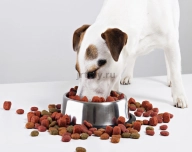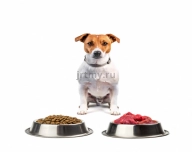Feeding ready-made feeds
Feeding ready-made feeds
Once again, you are faced with the problem of choice. The shelves of pet stores are filled with a variety of beautiful packages of dry food, colorful cans of canned food.

There are commercials on TV for "the best foods. What should you choose when you decide that you don't have time to make food and you will feed Jack a balanced store-bought food?
Here are some basic principles on which you should choose your food.
- Food should be appropriate for the age and condition of your pet. Every reputable pet food company makes different kinds of food: for puppies, for adult dogs, for senior dogs, for large and small breeds, for active dogs, and dogs with a couch potato lifestyle. There are special therapeutic foods designed for dogs with various conditions, such as allergies, kidney, stomach, musculoskeletal disorders, etc. The composition of these foods varies depending on the intended use. No food is suitable for a puppy and an older dog at the same time.
- Avoid cheap feeds. Use only Premium or Super Premium food. The fact is that cheaper food comes at the expense of cheaper ingredients. Animal protein may be poultry feathers or cattle hair. If all these proteins were normally digested in dogs, there would be no problem, but the fact is that they are not digested at all, that is, they are not broken down while having a very high energy content and a huge amount of protein. If you buy such a package of dry food with a label that says 40% protein content with an energy capacity of 90%, your dog will get absolutely nothing out of it. What's more, your dog could get food poisoning. The same goes for fiber, which can turn out to be wood chips ground into flour. Of course, there is no guarantee that Premium class food does not have the same cheap raw materials, but still, there is hope that behind the high price there are high-quality products.
- Monitor your pet's condition carefully. These observations will help you know if the food is suitable for him. If Jack eats with pleasure and has a good appetite, it means he likes the smell, taste, and consistency of the food. The pet's stools should be non-liquid, formed. This means that the gastrointestinal tract is working well and the food is digested without problems. The condition of Jack's coat and skin is a great indicator. If the coat is shiny, no rash, and the skin is clean, the food is suitable for the pet. Finally, Jack's overall behavior should be, as usual, cheerful, agile, and upbeat.
- When selecting food for Jack, keep in mind that he is an energetic dog, especially if you have a working dog and you take him to hunt or to competitions and exhibitions, therefore, the energy value of the food must be high.
- Talk to your breeder or veterinarian. He or she will professionally examine your pet and, depending on his or her health, will advise you on your pet's food.
Choosing which food is better - dry or canned, you should be guided by the preferences of the animal and its characteristics, for example, for a dog prone to obesity, it is better to feed canned food, as they have much fewer carbohydrates. Feeding ready-made food (as well as natural food) has its advantages and disadvantages. The main advantage is convenience. You always know the daily amount of food your pet needs - it's written on the package. You do not need to calculate the content of various useful elements in the food, the manufacturer has done it for you. It's easy to store and take it with you when you travel.
The disadvantages of ready-made foods include the presence of chemical additives in the food: preservatives, flavorings that make the food more appetizing for the dog, dyes. This is why ready-made foods can cause allergies in Jack. And in his opinion, natural foods taste much better.Premium foods: Acana, Orijent, Eukanuba, Hills and others.



